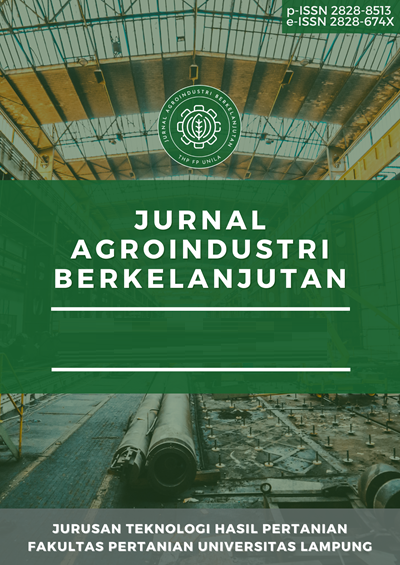THE INFLUENCE OF THE FORMULATION OF SUCROSE SUGAR AND HONEY PINEAPPLE (Ananas comosus L) ON THE SENSORY CHARACTERISTICS OF BLACK TEA KOMBUCHA DRINKS
DOI:
https://doi.org/10.23960/jab.v4i2.10971 Abstract View: 144
Abstract View: 144
Abstract
This study was conducted to determine the effect of sucrose sugar and honey pineapple formulations on the sensory characteristics of black tea kombucha, as well as to identify the best formulation in terms of sensory qualities. Kombucha is a fermented beverage believed to offer various health benefits. In this research, kombucha was produced using different proportions of sucrose sugar and honey pineapple. The experiment was designed using a Completely Randomized Block Design (RAKL) with 5 treatments and 5 replications, consisting of 5 ratios of sucrose sugar to honey pineapple: P1 (5% : 30%), P2 (10% : 25%), P3 (15% : 20%), P4 (20% : 15%), and P5 (25% : 10%). The observed parameters included pH measurement and sensory evaluation (scoring and hedonic tests covering taste, aroma, color, and overall acceptance). The best black tea kombucha formulation was further analyzed for alcohol content, vitamin C levels, and total reducing sugar. Data were analyzed for homogeneity using Bartlett’s test, , additional data using theTuckey test, analysis of variance (ANOVA), and further tested with BNT 5%. The results showed that the best treatment was P4 (20% sucrose sugar : 15% honey pineapple) with an alcohol content of 0.4%, total reducing sugar of 20%, vitamin C content of 0.5%, scoring test results for taste score 4.47, aroma score 4.14, color score 4.37, and hedonic test results for taste score 3.61, and overall acceptability score 3.71.

